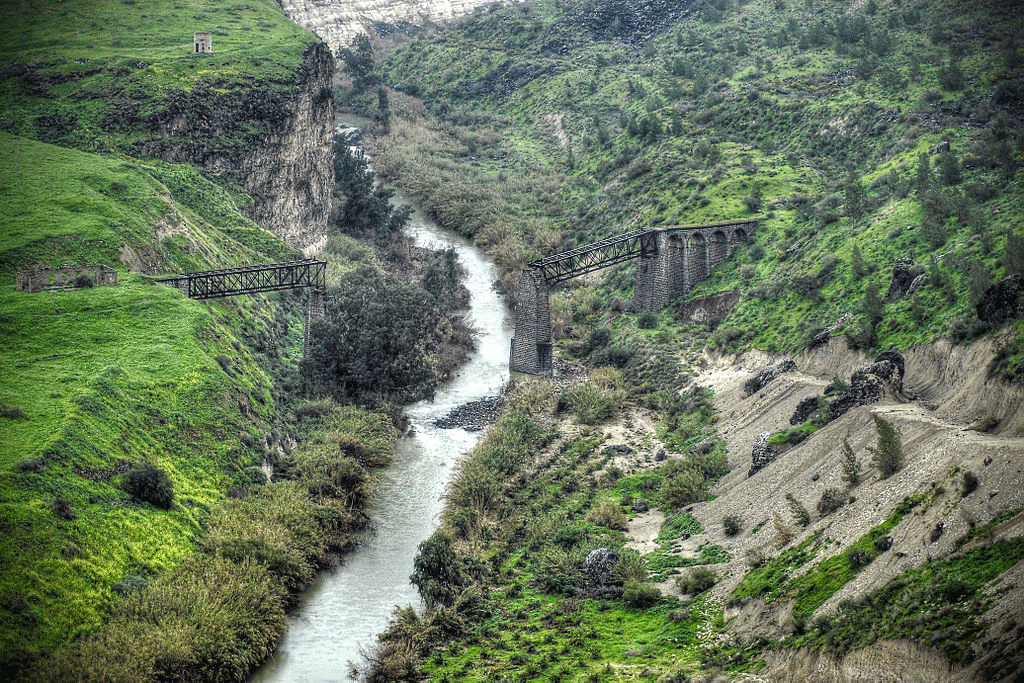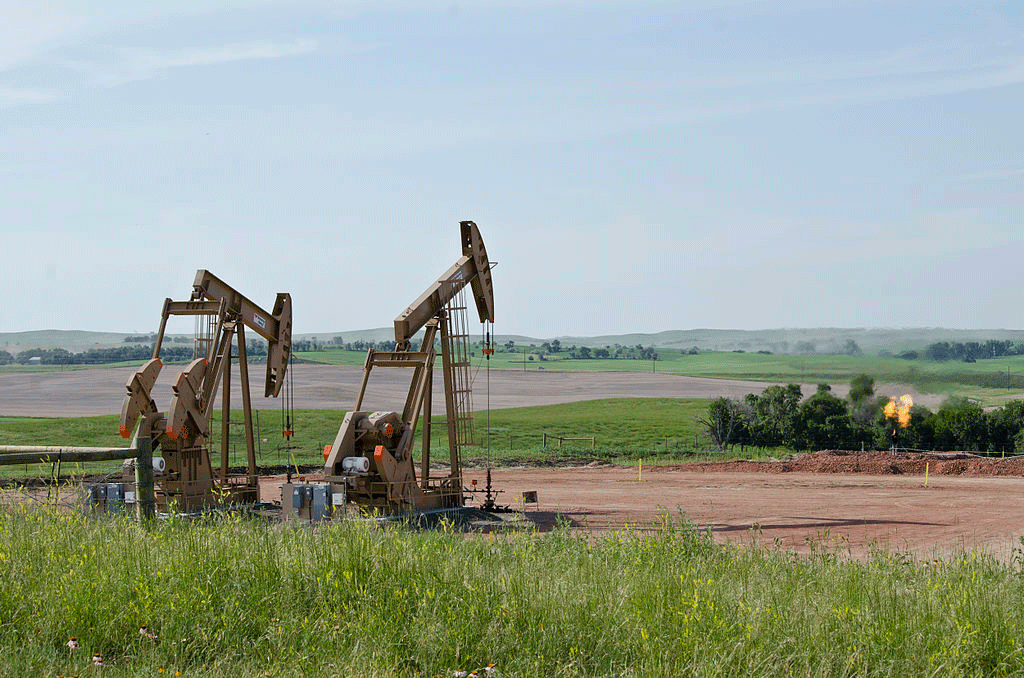Beyond the Headlines
Air Date: Week of February 28, 2014

A biblical river under environmental peril, is it too late? (Photo: Anark75, Creative Commons)
In this week’s trip beyond the headlines, Daily Climate publisher Peter Dykstra and LOE host Steve Curwood discuss fracking controversy surrounding the Head of Exxon Mobil, and the degradation of a biblical river’s ecosystem.
Transcript
CURWOOD: We turn now to Peter Dykstra, the publisher of Daily Climate.org and Environmental Health News, that's EHN.org. He's on the line from Conyers Georgia, ready to take us on a trip beyond the headlines. Hi there, Peter.
DYKSTRA: Hi, Steve. How are you doing?
CURWOOD: Good. What do you have for us this week?
DYKSTRA: Well, you know the old journalism tradition about the man-bites-dog story, the unexpected twist, the stories that have a blatant hypocrisy at their core?
CURWOOD: Yep, they’re a staple of the news business, and they’ve been known to show up on this show.
DYKSTRA: Well apparently those kinds of stories are one more thing that grows a little bit bigger in Texas. Let me tell you about, Rex Tillerson, he’s the CEO of Exxon/Mobil, one of the mightiest oil and gas operations on Earth. Rex is part of a lawsuit, and it involves a potential fracking operation near his multi-million dollar ranch northwest of Dallas. They’re planning to build a huge water tower near Rex’s ranch, the water will largely be used to supply fracking operations, and of course that will in turn draw a lot of truck traffic, and will all come into Mr. Tillerson’s Neighborhood.
CURWOOD: So the CEO of a global oil and gas company is trying to hinder fracking if it’s happening in his ‘hood?

Fracking wells in North Dakota (Photo: Tim Evanson, Creative Commons)
DYKSTRA: Yeah, some of the reporting on this, and there’s been a ton of reporting on it because we all love that little hypocrisy story. Some of the reporting’s been a little breathless and over-the-top because technically, the lawsuit has nothing directly to do with fracking. Rex Tillerson’s lawyer said the CEO of Exxon/Mobil still absolutely loves fracking. He’s just a little worried about what that tower, and all that fracking water and all those fracking water trucks are going to do to his property values. I’ve got something else for you for bonus points.
CURWOOD: Fire away, Peter.
DYKSTRA: One of the other plaintiffs in the lawsuit is Tillerson’s ranching neighbor. He also happens to be a big fan of fracking in normal times. He’s the former House Majority Leader, former Congressman Dick Armey.
CURWOOD: So in other words, the plaintiffs are armed with a Rex. T. and a Richard Armey.
DYKSTRA: ...and we’ll see how far the lawsuit gets…
CURWOOD: What’s going on elsewhere?
DYKSTRA: This past week, from National Geographic’s website, maybe the best lead sentence to a story I’ve seen in months: “If Jesus were to plunge into the Jordan River today, he might well injure himself.”
CURWOOD: [LAUGHS] You’ve got to call this a lead of biblical proportions?
DYKSTRA: Yes, and the reason for it is because the Jordan River is drying and it’s dirty. So also is the Dead Sea, and the Sea of Galilee. You’re talking about some of the most historic and famous waterways in the world, the River Jordan. But it’s never been a big river. It flows through a dry land. That dry land is increasingly full of more and more people. Those people have been in conflict with each other to one degree or another for a long long time. There are farms and cities that are growing and sucking up the water from the River Jordan. They return pollution to it. The desert geology makes the river salty, and as the problem worsens, no one can get enough water.
CURWOOD: As if the folks in the Middle East didn’t need more reasons for conflict.
DYKSTRA: Yes, and that backdrop of conflict throughout the region, and we’re talking about the place where the River Jordan starts - there are tributaries that run out of Lebanon and Syria. And it makes even more difficult with all that conflict that makes it a longshot that this problem can be solved anytime soon.
CURWOOD: Hey, Peter, before you go, what go you have on the history calendar this week?

Oops, Mr. President! A misquote in time… (Photo: Public Domain)
DYKSTRA: We have the anniversary of one of the greatest mis-quotes in environmental history. Ronald Reagan got ridiculed by the media, he got ridiculed by standup comics, and certainly by Democrats for saying the immortal words, “If you’ve seen one tree, you’ve seen them all.” The problem with this is there’s no evidence Ronald Reagan actually ever said those words. He did apparently say something similar to that. He was speaking to an industry group, the Western Wood Products Association. It was 48 years ago this month. Ronald Reagan was running for Governor of California, and he was asked about a proposed expansion of Redwoods National Park, the biggest trees in the world. Reagan opposed that expansion. Ronald Reagan told the group, and these were his real words as best we can tell, “A tree is a tree. How many more do you have to see?”
CURWOOD: Obviously he should have had someone log all his comments.
DYKSTRA: By the time he made it to the White House 14 years later, he had no problem with a lot more logging.
CURWOOD: I guess.
CURWOOD: Peter Dykstra, the publisher of Environmental Health News and the Daily Climate.org. Thanks so much, Peter.
DYKSTRA: Thanks a lot, Steve. Talk to you soon.
Links
Living on Earth wants to hear from you!
Living on Earth
62 Calef Highway, Suite 212
Lee, NH 03861
Telephone: 617-287-4121
E-mail: comments@loe.org
Newsletter [Click here]
Donate to Living on Earth!
Living on Earth is an independent media program and relies entirely on contributions from listeners and institutions supporting public service. Please donate now to preserve an independent environmental voice.
NewsletterLiving on Earth offers a weekly delivery of the show's rundown to your mailbox. Sign up for our newsletter today!
 Sailors For The Sea: Be the change you want to sea.
Sailors For The Sea: Be the change you want to sea.
 The Grantham Foundation for the Protection of the Environment: Committed to protecting and improving the health of the global environment.
The Grantham Foundation for the Protection of the Environment: Committed to protecting and improving the health of the global environment.
 Contribute to Living on Earth and receive, as our gift to you, an archival print of one of Mark Seth Lender's extraordinary wildlife photographs. Follow the link to see Mark's current collection of photographs.
Contribute to Living on Earth and receive, as our gift to you, an archival print of one of Mark Seth Lender's extraordinary wildlife photographs. Follow the link to see Mark's current collection of photographs.
 Buy a signed copy of Mark Seth Lender's book Smeagull the Seagull & support Living on Earth
Buy a signed copy of Mark Seth Lender's book Smeagull the Seagull & support Living on Earth

